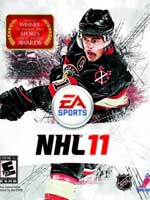Masterpiece on the Ice
Just a few weeks ago, we took a look at NHL 2K11, 2K Games’ entry in the hockey genre this year. That game, a Wii exclusive, did a decent job of incorporating MotionPlus but didn’t make the sport any more accessible to casual fans or change too much beyond the control scheme.
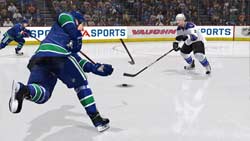
So, what about 2K’s rivals, EA Sports? EA’s NHL 11 has been released on Xbox 360 and PS3 but not Wii, so it doesn’t have to compete with 2K11 on any single console. Without an opposing player to keep them honest, did EA play it safe, or did they take some chances on the ice?
A little bit of both. Fans of NHL 09 and NHL 10, which are widely considered masterpieces of the hockey genre, will feel right at home in NHL 11. Less serious fans probably won’t notice much of a difference, save the updated rosters and the addition of the Canadian Hockey League. The truly hardcore, however, will savor the changes, including a new physics engine and an insanely complicated added game mode.
The physics engine is a significant improvement over what we’ve seen in past hockey games. When objects interact on the ice, they no longer move using preset animations; instead, the physics engine takes all the various movements into account and animates the players and the puck in real time. The result is the game feels incredibly organic. When players collide, it looks perfectly natural, and when the puck hits various surfaces (the wall, the goalpost, the goalie’s padding), it bounces off just the way it should. Whereas NHL 2K11 enhanced realism by allowing you to move your Wii controller like a hockey stick, NHL 11 enhances realism by making the entire rink come alive with true-to-life animations presented in high definition. We’re not sure which improvement is more important, but we certainly can’t wait until someone combines them into a single game competently.
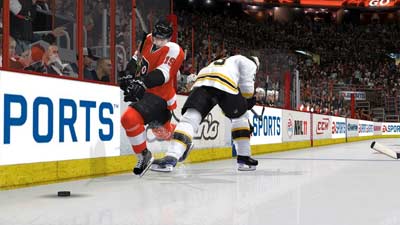
Other than that, the basics are pretty much the same as what we saw last year. The graphics feature good character models, though they’re something less than photorealistic. The sound is on par with the series’ standards, with great announcing, decent music, and good sound effects.
Also, you’ll control players on the ice the same way (with the two-joystick setup introduced in NHL 07) for the most part, though there are improved systems for faceoffs and boardplay. These systems allow you more options and make the game more realistic, though also more complicated. There’s also a new passing system with improved accuracy, but unfortunately, it’s a little too demanding. The aiming is touchy, you have to be in a good passing position to pull it off, and the pass is timed to your release of a trigger button (holding it down longer makes the pass harder). We’d have appreciated a tutorial for it. We can’t tell you how many times we passed the puck to opposing teammates (or to no one at all) before the new controls started to sink in.
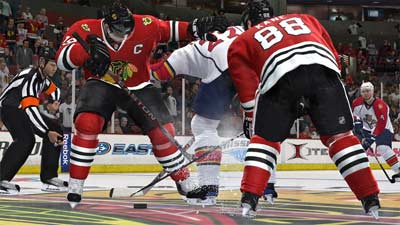
The game modes from past years return as well. There’s exhibition, Be A GM (in which you play as a team’s general manager and have to make trades, etc.), Be A Pro (in which you play out a career as a single player), Tournament, Playoffs, Season, Battle for the Cup (in which you skip the season, and instead just pick two teams and fight for the Stanley Cup), and EA Sports Hockey League (in which you create a team and face others in an Internet league).
Within these modes, some of the series’ old problems crop up. Computer-controlled teammates often don’t follow you to the opposing goal when you make a run at it, for example, and AI general managers often exhibit amazingly stupid behavior (accepting deals they should decline and vice-versa). Overall, though, EA’s NHL formula has been honed to the point that there are few flaws. For example, we didn’t find any surefire ways to get pucks past the AI goalies, though only time will tell if there are exploitable cheap shots we didn’t come across. (In a hockey title, is there anything more frustrating than a tiny flaw in the goalie AI that breaks the game?)
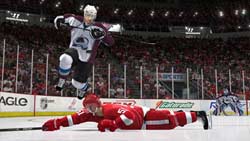
The big addition, of course, is the EA Sports Ultimate Hockey League, and what you think of it will depend on how hardcore you are. It’s something like fantasy hockey on steroids. You start out with a deck of playing cards that represent things like players, staff, and training, and you have to put together a club and play games against online opponents. Some cards are free, but others cost pucks, the league’s currency, which are earned by winning games. The sheer amount of detail is alternately stunning and overwhelming. Your players must have excellent chemistry, and you can choose everything from the arenas you play in to the head coach. Some cards (such as training cards) can be added to a player to increase his attributes, and each player has a limited contract and a limited number of games he can play in his career. To a true statistics junkie, the kind of person who will keep a spreadsheet on his computer to keep track of his team and obsessively pore over the numbers nightly, this is heaven. To most other people, it will require more of a time investment than it’s worth.
Our biggest problem with NHL 11, however, is the middle finger it extends toward renters and used-game buyers. In a move EA evidently plans to repeat with many more games in the future, NHL 11 comes with a one-time-use code that enables the full online feature set. Renters can take advantage of a free seven-day teaser pass, as long as they don’t keep the game longer than that, but everyone else has to shell out cash to enjoy the game to the fullest. This is part of the war on used games, which has even included statements from developers that secondhand dealers should have to give them money by law. (Evidently, they’re not clear on the fact that “copyright” means the “right” to “copy” something, not the right to take a slice of profit whenever an existing copy changes hands. The companies are essentially asking the government to transfer some of the money you make from the sale of your own property to them.)
The pay-to-play scheme is more defensible than the proposed law (EA can charge for access to its online servers if it so chooses), but it’s still a low blow to gamers on a budget. NHL 11 has a lot of features that will encourage gamers to hang on to it rather than trading it in. EA should have felt confident enough in the value they provided not to nickel-and-dime those who obtain the product secondhand.
The extra charge leaves a bitter taste in our mouth. Still, we cannot deny that NHL 11 is an improvement over what came before it, and truly hardcore hockey fans will enjoy the hours they spend fine-tuning their teams in the new online mode. There are a few improvements yet to be made, and we hope the next installment will take advantage of Move and Kinect to provide even more realism. But those in the market for a new hockey game should be happy with NHL 11.
RATING OUT OF 5 RATING DESCRIPTION 4.4 Graphics
The new physics engine is truly a great accomplishment. 4.6 Control
It’s the old two-joystick setup, plus some new moves to make the game even more comprehensive (and complicated). 4.2 Music / Sound FX / Voice Acting
The sound is no better or worse than you’d expect, with decent music, great announcing, and good sound effects. 4.6 Play Value
Those who don’t explore the new mode won’t notice too much of a difference with past entries, but this is still a huge game, and hardcore hockey gamers will have a field day. 4.4 Overall Rating – Must Buy
Not an average. See Rating legend above for a final score breakdown.
Game Features:
